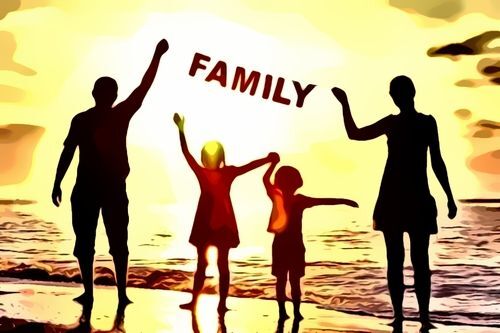IELTS Topic: Family
VOCABULARY & EXPRESSIONS
Go over the following vocabulary and expressions with your tutor. Read the word/expression and definition out loud, and your tutor will go over anything you do not understand. Practice creating a sentence or two to make sure you know how to use the word/expression properly.
Vocabulary/ Expressions
Nuclear family | (noun) – a family consisting of the parents and their children My nuclear family consists of myself, my wife, two sons and daughter. | |||||||||||||||||||||||||||||||||||||||
Extended family | (noun) – a family unit that includes grandmothers, grandfathers, aunts, uncles, and cousins in addition to parents and children I do not communicate with my extended family very often as we live far away from each other. | |||||||||||||||||||||||||||||||||||||||
Single parent | (noun) – someone who has a child or children but no husband, wife, or partner who lives with them I have a friend who is a single parent raising her kids since her husband passed away. | |||||||||||||||||||||||||||||||||||||||
Sibling | (noun) – a brother or sister I have three siblings, my sister and two brothers. | |||||||||||||||||||||||||||||||||||||||
Relative | (noun) – a member of your family I have one relative who lives in Australia. | |||||||||||||||||||||||||||||||||||||||
Grow up | (phrasal verb) – to go from being a child to an adult Children grow up so fast these days. | |||||||||||||||||||||||||||||||||||||||
Divorce | (noun or verb) – a legal process to end a marriage The number of divorced people has risen a lot in the last 10 years. | |||||||||||||||||||||||||||||||||||||||
Childcare | (noun) – the care of children by a day-care center, babysitter, or other providers while parents are working My sister works as a day care facilitator looking after very young children. | |||||||||||||||||||||||||||||||||||||||
Your own flesh and blood | (idiom) – a member of your family My cousin is my own flesh and blood even though he lives in a different country. | |||||||||||||||||||||||||||||||||||||||
It runs in the family | (idiom) – an ability that is passed on through the generations My talent for singing comes from my mothers so my talent for singing runs in our family. | |||||||||||||||||||||||||||||||||||||||
PART 1 QUESTIONS
Introduction and interview (4-5 minutes)
Here are possible questions that might come up during the test. Go over them with your tutor.
In the first part, the examiner will ask you a number of general questions
Topic
How many people are there in your nuclear family?
Do you have a large or small extended family?
In what way is your family important to you?
In what ways do families support each other?
What sorts of things do you like to do together?
Did/Do you get well with your family? Why?
Who are you close to in your family?
Can you tell me something interesting about your family?
Are there many different types of families in your country?
What are families like in your country?
Do you think the structures of families have changed over the years?
What is your idea of a perfect family?
PART 2 QUESTIONS
Individual long turn (3-4 minutes)
Here are possible questions that might come up during the test. Go over them with your tutor.
You will have 1 minute to prepare to speak, and then you will talk for 2 minutes, during which the examiner will not speak.
Part 2 – sample task card
Sample A
Describe a happy childhood memory.
You should say:
when it happened
who was with you
how you felt at the time
and why you remember this specific time.
Sample B
Talk about a family member you admire the most.
You should say:
who it is
what is their relationship to you
what qualities he/she has
and why you admire him/her so much.
Sample C
Describe a family vacation you went on.
You should say:
where you went
which family members went with you
what you did together while on vacation
and how you felt about the time together
PART 3 QUESTIONS
Two-way discussion (4-5 minutes)
Here are possible questions that might come up during the test. Go over them with your tutor.
In the last part, you will talk with the examiner about issues related to the topic on the card.


